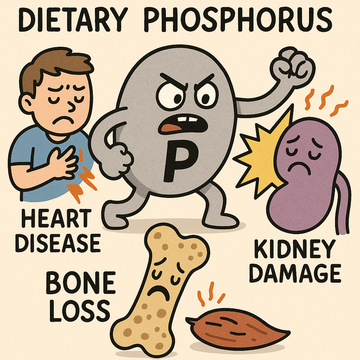
1. Is Dietary Phosphorus Harmful to the Human Body?
The modern Western diet delivers significantly more phosphorus than our bodies evolved to handle, and research suggests this excess may contribute to:
i) Kidney Stress and Damage. See A.R. Chang & C. Anderson (2017) "Dietary Phosphorus Intake and the Kidney." Annu Rev Nutr. Author manuscript; available PMC:2017 Nov 15.
ii) Cardiovascular Disease. See J. Kendrick, et. al. (2014) "Phosphate and Cardiovascular Disease." Adv Chronic Kidney Dis. Author 2011 Mar;18(2):113-119.
iii) Bone Demineralization. See C.J. Vorland, et. al. (2018) "Effects of Excessive Dietary Phosphorous Intake on Bone Health." Curr Osteoporos Rep. 2017 Oct;15(5):473-482.
iv) Premature Aging. See Makoto Kuro-o (2021) "Phosphate as a Pathogen of Arteriosclerosis and Aging." J. Atheroscler Thromb. 2021 Mar 1;28(3):203-213.
2. Where Excess Phosphorus Come From
Phosphorus pervades the "Western Diet" which is both acidic and high in phosphorus. In foods, phosphorus exists in two main forms:
| Type | Examples | Absorption Rate |
|---|---|---|
| Organic phosphorus | Meat, dairy, legumes, nuts | 40–60% |
| Inorganic phosphorus | Additives in processed foods, sodas | 90–100% |
The phosphorus added to processed foods — especially in the form of phosphate salts (e.g., sodium phosphate, phosphoric acid) — is highly absorbable and lacks the natural buffering elements (like calcium, potassium, and magnesium) found in whole foods.
Most Americans now consume 2–3 times the recommended daily intake of phosphorus, largely due to:
-
Processed meats
-
Colas and soft drinks (phosphoric acid)
-
Fast foods and frozen meals
-
Shelf-stable bakery products
-
Cheese spreads and dairy products with phosphate emulsifiers
3. Why Too Much Phosphorus Is Harmful
While healthy kidneys can excrete excess phosphorus, chronically high intake can overwhelm the body’s regulatory systems — even in people without diagnosed kidney disease. Over time, this may lead to:
⚠️ A. Kidney Stress and Decline
Phosphorus is excreted by the kidneys. Excess intake raises the kidney’s workload, increasing urinary phosphate load and contributing to renal inflammation and damage over time.
Studies show that high phosphate diets accelerate kidney aging, even in otherwise healthy individuals.
⚠️ B. Vascular Calcification and Heart Disease
Elevated blood phosphate levels trigger vascular smooth muscle cells to convert into bone-like cells, promoting arterial calcification. This hardens blood vessels, increasing the risk of:
-
High blood pressure
-
Left ventricular hypertrophy
-
Heart failure
In patients with mild kidney dysfunction, high serum phosphorus is independently associated with increased cardiovascular mortality (Block et al., 2004).
⚠️ C. Hormonal Disruption (PTH and FGF23)
To regulate phosphorus, the body increases secretion of parathyroid hormone (PTH) and fibroblast growth factor 23 (FGF23). Chronically elevated levels of these hormones can:
-
Leach calcium from bones (weakening skeletal integrity)
-
Suppress vitamin D activation
-
Increase blood pressure
-
Promote left heart hypertrophy
This triad — high phosphorus, high PTH, and high FGF23 — is strongly associated with chronic kidney disease progression and early cardiovascular aging.
⚠️ D. Bone Loss and Osteoporosis
Phosphorus competes with calcium for absorption and triggers hormonal shifts that pull calcium from bones. Diets high in phosphorus (especially from additives) but low in calcium lead to:
-
Lower bone mineral density
-
Higher fracture risk, especially in aging populations
This effect is worsened when systemic acidosis is present — a common consequence of diets rich in meats and processed foods and low in alkaline minerals.
⚠️ E. Accelerated Cellular Aging
Emerging research shows that high phosphate levels activate pro-aging signaling pathways and increase oxidative stress at the cellular level.
High phosphate diets have been shown to shorten lifespan in mice, and elevated serum phosphate is correlated with early mortality in humans, even when within the "normal" range.
4. Phosphorus and Acidosis: A Double Burden
Most high-phosphorus foods (meats, cheese, sodas) are also acid-forming — they lower systemic pH and promote low-grade metabolic acidosis. This creates a vicious cycle:
-
Acidosis triggers bone breakdown to release buffering minerals (like calcium and phosphate)
-
This increases circulating phosphorus
-
Which worsens vascular calcification and kidney burden
In short, acidic diets rich in phosphorus speed up internal wear and tear, especially on the bones, kidneys, and cardiovascular system.
5. Who Should Be Concerned?
While phosphorus is a concern for everyone in excess, certain groups are at greater risk of phosphorus-related harm:
-
People over age 40 (kidney function declines naturally with age)
-
Individuals with chronic kidney disease (CKD)
-
People consuming high amounts of processed foods
-
Those with osteoporosis, hypertension, or heart disease
Even before kidney disease is diagnosed, subclinical phosphate burden can cause harm — making phosphorus management a preventive health strategy.
6. How to Lower Your Phosphorus Burden
Here are evidence-based steps to reduce dietary phosphorus load:
✅ Consider Dietary Alkalinity: Bicarbonate- and citrate-rich diets — such as those emphasizing certain fruits, vegetables, and natural waters — have been studied for their potential role in supporting healthy acid-base balance. Talk to your healthcare provider before using supplements.
✅ Limit processed foods: Avoid items with “phos-” on the label (e.g., phosphoric acid, sodium phosphate).
✅ Favor whole foods: Emphasize fruits, vegetables, legumes, and whole grains. These contain phosphorus in less absorbable forms and offer protective minerals.
✅ Balance calcium intake: Ensure adequate calcium (from whole food sources) to reduce phosphate uptake.
✅ Stay hydrated: Adequate water intake helps kidneys excrete phosphate more efficiently.
✅ Check with your doctor if you have CKD, hypertension, or bone disease. You may need to monitor serum phosphate levels or take phosphate binders.
Conclusion
While phosphorus is an essential nutrient, modern diets deliver too much — in forms the body struggles to handle. Over time, this excess may silently damage the kidneys, bones, blood vessels, and heart. By understanding where harmful phosphorus comes from and taking simple steps to reduce it — including choosing alkalizing options — we can protect our long-term health and reduce the burden of hidden phosphorus overload.
⚖️ Disclaimer
This article is for informational purposes only. It is not intended to diagnose or treat any condition. Please consult your healthcare provider before making any medical decisions.



